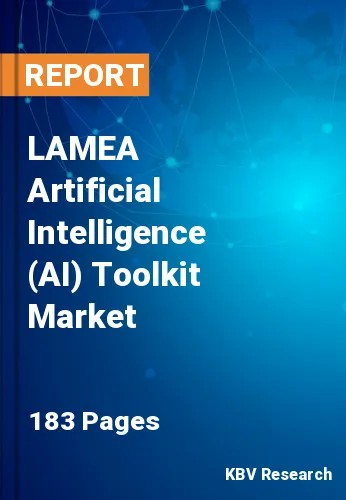The Latin America, Middle East and Africa Artificial Intelligence (AI) Toolkit Market would witness market growth of 37.7% CAGR during the forecast period (2023-2030).
Transfer learning, where AI models leverage knowledge gained from one domain to excel in another, has seen rapid development. Innovations in transfer learning toolkits have led to applications in healthcare, finance, and more. Developments in multi-modal AI toolkits enable developers to create models that comprehend and produce material in various modalities, including text, image, and audio. This has implications for content generation, chatbots, and more. AI toolkits are incorporating automated hyperparameter tuning capabilities, reducing the need for manual fine-tuning, and optimizing model performance. Innovations in conversational AI toolkits enable the development of more sophisticated chatbots and virtual assistants.
These toolkits improve natural language understanding and generation. Hardware-accelerated AI toolkits have emerged to meet the demand for AI processing on edge devices. These innovations facilitate real-time inference for applications like autonomous vehicles and smart cameras. Innovations in model compression techniques have made it possible to deploy large AI models on resource-constrained devices without sacrificing performance. AI toolkits are integrating with hybrid cloud platforms, allowing organizations to build AI models in a hybrid cloud environment, offering the flexibility to manage data and computation between on-premises and cloud resources.
According to International Trade Administration (ITA), the Abu Dhabi Department of Economic Development (ADDED) announced a new Smart Manufacturing initiative in October 2021 to diversify the emirate's economy and attract foreign companies. This new initiative coincides with the Ministry of Industry and Advanced Technology's "Industry 4.0" initiative by the federal government. By 2031, the UAE desires to grow manufacturing by 30% and GDP by $6.8 billion. As per ITA, in Saudi Arabia, 556,000 vehicles were sold in 2019 and 436,000 in 2020. The projected sales figure for 2025 is 543,000 units, of which electric vehicles comprise only 32,000. The factors mentioned above will drive the regional market growth.
The Brazil region dominated the LAMEA Artificial Intelligence (AI) Toolkit Market by Country in 2022, and would continue to be a dominant market till 2030; thereby, achieving a market value of $2,886.5 million by 2030. The Argentina region is showcasing a CAGR of 38.4% during (2023 - 2030). Additionally, The UAE region would register a CAGR of 37.3% during (2023 - 2030).
Based on Component, the market is segmented into Software, Hardware (Processors, Accelerators, Others), and Services. Based on Technology, the market is segmented into Natural Language Processing, Computer Vision, Machine Learning, and Robotic Process Automation. Based on Vertical, the market is segmented into BFSI, IT & Telecom, Government & Defense, Healthcare & Lifesciences, Media & Entertainment, Retail & Ecommerce, Automotive, Transportation & Logistics, Energy & Utilities, Manufacturing, and Others. Based on countries, the market is segmented into Brazil, Argentina, UAE, Saudi Arabia, South Africa, Nigeria, and Rest of LAMEA.
Free Valuable Insights: The Worldwide Artificial Intelligence (AI) Toolkit Market is Projected to reach USD 164.4 Billion by 2030, at a CAGR of 34.3%
The market research report covers the analysis of key stake holders of the market. Key companies profiled in the report include Microsoft Corporation, IBM Corporation, Google LLC, Oracle Corporation, NVIDIA Corporation, Thales Group S.A., Intel Corporation, Adobe, Inc., Salesforce, Inc. and DataRobot, Inc.
By Component
By Technology
By Vertical
By Country
Our team of dedicated experts can provide you with attractive expansion opportunities for your business.

